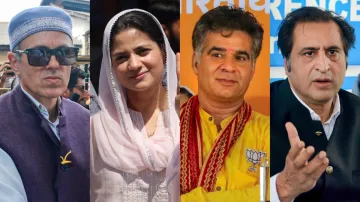Jammu and Kashmir Elections Results LIVE 2024: The counting of votes for the Assembly elections in Jammu and Kashmir is taking place today (October 8). The counting in Haryana is also taking place along with Jammu and Kashmir. The Assembly elections in Jammu and Kashmir were held between September 18 and October 1. There are 90 Assembly seats in Jammu and Kashmir. 7 seats are reserved for Scheduled Castes (SCs), and 9 seats are reserved for Scheduled Tribes (STs) in the state Assembly. There are 88,66,704 voters in Jammu and Kashmir.
Main parties in Jammu and Kashmir
The Jammu and National Conference (JKNC) of Farooq and Omar Abdullah, the People's Democratic Party (JKPDP) of Mehbooba Mufti, the Congress, and the BJP are the four major political players in Jammu and Kashmir. Altaf Bukhari's Jammu and Kashmir Apni Party (JKAP), Sajad Gani Lone's Jammu and Kashmir People's Conference (JKPC), and Gulam Nabi Azad's Democratic Progressive Azad Party (DPAP) are the other important parties in the Union Territory. The Congress and the National Conference are allies along with the Communist Party of India (Marxist) and the Jammu and Kashmir National Panthers Party (JKNPP). The Awami Ittehad Party (AIP) of Engineer Rashid is also in the fray.
Key candidates in Jammu and Kashmir
Former Chief Minister Omar Abdullah (JKNC), Iltija Mehbooba Mufti (JKPDP), Vikar Rasool Wani (Congress), Hasnain Masoodi (JKNC), Waheed Para (JKPDP), Ghulam Ahmad Mir (Congress), Ravinder Raina (BJP), Ali Mohammad Sagar (JKNC), Shamim Firdous (JKNC), Ghulam Nabi Lone (JKPDP), Sofi Yousuf (BJP), Abdul Rehman Veeri (JKPDP), Sunil Kumar Sharma (BJP), Mohamad Yousuf Tarigami (CPM), Peerzada Mohammad Syed (Congress), Mirza Mehboob Beg (JKPDP), Ghulam Mohammad Saroori (Independent), Sajad Gani Lone (JKPC), Altaf Bukhari (JKAP), Tara Chand (Congress), Balwant Singh Mankotia (BJP), Harsh Dev Singh (JKNPP), Mohammed Yousuf Tarigami (CPM), Abdul Rahim Rather (JKNC), Tariq Hameed Karra (Congress), Shagun Parihar (BJP), Chaudhary Lal Singh (Congress) and Muzaffar Hussain Baig (Independent) are some of the key candidates in Jammu and Kashmir.
Key constituencies in Jammu and Kashmir
Pampore, Pulwama, Kulgam, Dooru, Anantnag, Srigufwara-Bijbehara, Kishtwar, Padder-Nagseni, Banihal, Ganderbal, Sopore, Habbakadal, Uri, Budgam, Central Shalteng, Chrar-i-Sharief, Nowshera, Shri Mata Vaishno Devi, Handwara, Kupwara, Basholi, Langate, Baramulla, Lal Chowk, and Jammu East are some of the key Assembly constituencies in Jammu and Kashmir.
Polling percentage in 2014
Jammu and Kashmir registered 65.91 per cent of voting in the Assembly Election 2014. It was 61.16 per cent in 2008.
What happened in the 2014 and 2008 Assembly Elections in Jammu and Kashmir?
In the 2014 Jammu and Kashmir Assembly Election, the JKPDP won 28 seats and became the single largest party. The BJP performed well and won 25 seats. Both parties decided to form a coalition government under Mufti Mohammad Sayeed. The National Conference was reduced to just 15 seats while the Congress bagged 12 seats. In the 2008 Jammu and Kashmir Election, the National Conference won 28 seats, and its alliance partner Congress emerged victorious in 17 seats. Omar Abdullah became the state's youngest-ever Chief Minister at 38. The JKPDP won 21 seats, and the BJP improved its performance to win 11 seats.
How many seats are required to form government in Jammu and Kashmir?
Every party or any coalition must reach the majority mark in the Legislative Assembly to form the government in the state. The majority mark in each state Assembly depends upon the total number of seats in the Legislative Assembly of a particular state. The majority mark in any state is half of the number of total Assembly seats plus one more seat. The Jammu and Kashmir Assembly has 90 seats, and the majority mark is 46.
